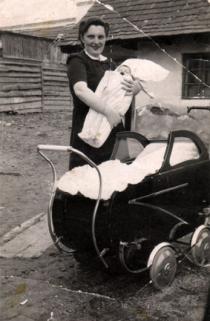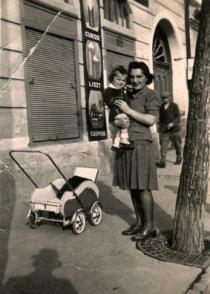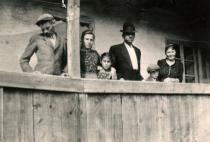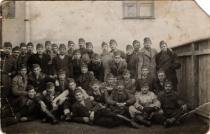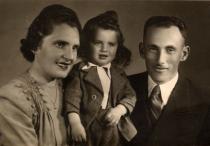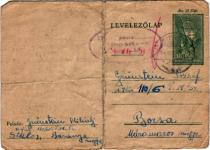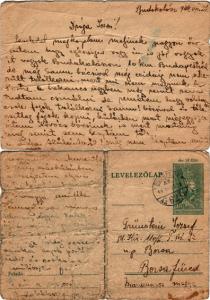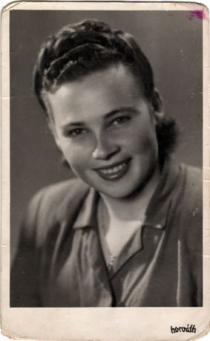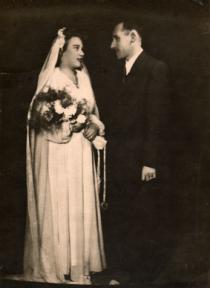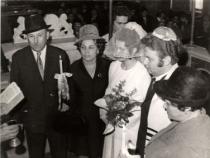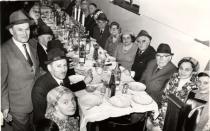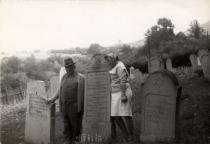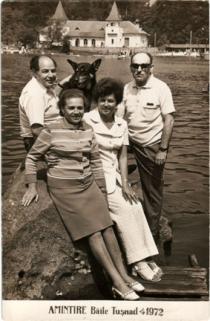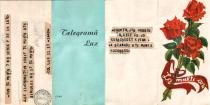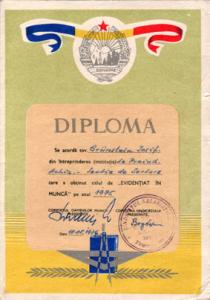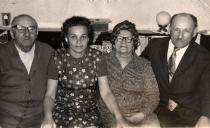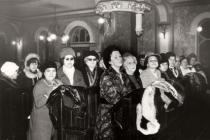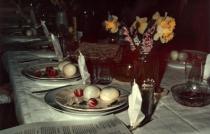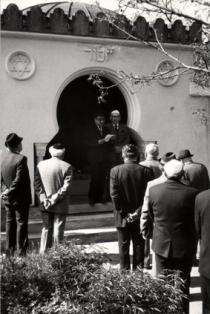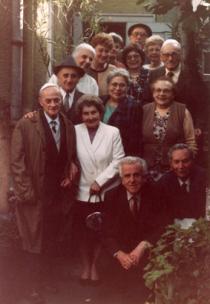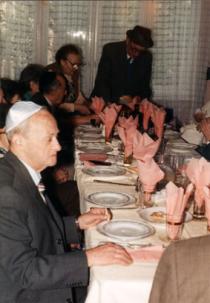The photo was taken in our home. It is written on its back: April 4th, 1975. This means it was Pesach, because my father and mom always spent holidays at us. In the background you can see the sofabed. The furniture is arranged in the same way as then, because nothing has changed. The first person from the left is my father, and I’m next to him. The first from the right is my husband, then comes my step-mother, Lujza. I bought her a wig, because she didn’t have much hair, she lost it, so I bought her a wig because of this and because of the religion; after that she always wore a wig.
Some friends were visiting us from Kolozsvar, two families, and one of them had a camera, and said he would take a photo of us. I’m looking really bad, because my father was in the epidemic hospital. I visited him every day. My husband and my step-mother had a flu, so at home I nursed them, and I also visited my father each day. I was so exhausted. Imre Lax, a friend of us who was a doctor, looked at me and said: “Everybody recovered at the ‘Grunstein Hospital’, yet there is someone who looks dreadfully” - that was me, I was forty-eight years old.
My step-mother was called Lujza Adler after her first husband, and Lae was her Jewish name. I don't know what his first husband's name or occupation was. Before the war they lived in Torda. Her husband was ill, and died at a young age. Lujza wasn't deported, because she lived in Torda; she came to Marosvasarhely after the war, and worked in the kosher canteen. There was a kosher canteen next to the synagogue, at its back, it served mainly Jewish students, but not only. She came to visit his brother-in-law, Arisztid Adler, who was the friend of my brother-in-law, Marton Grunstein; the later presented my mom [step-mother] to my father. She offered him cholent. When he came home, I asked him where he had been for so long. He answered: 'I was to look for a wife.' He added that we were supposed to pay a visit to them at five. That's what happened, we visited them on Saturday afternoon, and I took such a liking for her, because she was a very skilful woman, a clean housewife; Lujza was also a very nice woman. I told her: 'Listen, dear, my father needs nothing but a woman. You mustn't bring there even a needle.' Mom visited my father in Saratel with Arisztid's mother. They took a look, they were pleased, the house was supplied with everything; so they agreed to get married in two weeks.
My parents got married in 1947. Before the war Lujza worked in Torda. She learnt how to make the upper part of shoes, and she worked as a shoemaker in order to provide for her children. Poor Lujza had nothing. She had a coat she had refashioned from the coat of her ex-husband; she had only a little suitcase. Her son-in-law from Kolozsvar came to the wedding; they got married here, in Marosvasarhely, in the synagogue. According to Judaism, when parents get married for the second time, children mustn't be present, so I prepared a dinner at home, and I invited her son-in-law and my brother-in-law's family; otherwise there wasn't any party organized. The next day they went to Torda and Kolozsvar to meet Lujza's children, and from there they went home to Saratel. After my step-mother got married, she quitted her job at the canteen; what became of it later, I don't know that.
In 1949 my father and Lujza left for Israel with a permit to leave definitely. After my father arrived to Israel, he took out his stepson, Joszif from the kibbutz. He told him: you're here for so many years, and you don't even have underpants, because there people shared everything. But Joszif didn't treat him nicely. In Israel both my father and Lujza worked, I think in a leather factory. He even bought animals and established a farm, but he threw up everything and came home in 1953; he said for him Israel was where his kid was, and so he came home. Lujza came with him, her daughters still lived here, but all in vain, they didn't bother much for her. They settled in Saratel; there was a small shop, my father set it up, and ran it. Later they moved to Beszterce, he quitted his house and everything. Gypsy people moved into his former house. It is still there, but I didn't get it back yet.

